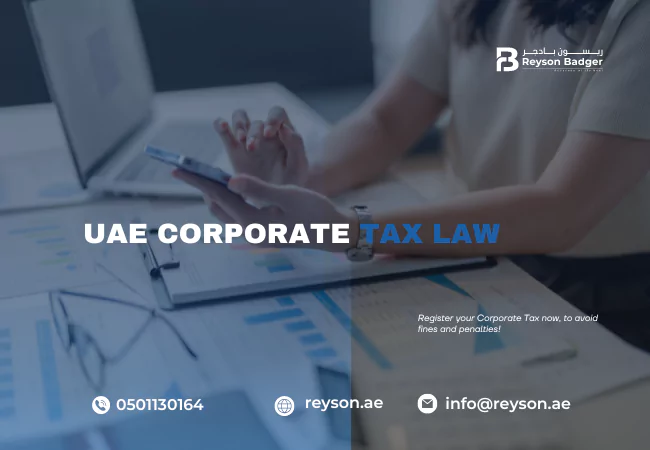According to the UAE Corporate tax law, businesses earning annual taxable profits up to AED 375,000 will be exempt from taxes starting June 1, 2023. For profits exceeding this threshold, a 9% tax rate will apply. This law establishes the framework for a Federal Corporate Tax Law in the UAE, effective from June 1, 2023. The federal decree law outlines the criteria, tax rates, and other pertinent details necessary for businesses preparing for corporate tax implementation. This tax, levied directly on business profits, was introduced in the UAE to fortify its position as a premier global hub for business and investment.
According to the UAE's Corporate Tax Law, profits exceeding AED 375,000 will be taxed at a standard rate of 9%, while small firms and start-ups with profits up to this threshold will enjoy a 0% tax rate. The Corporate Tax not only supports the growth and transformation necessary to achieve strategic goals but also reinforces the commitment to adhering to international standards of transparent taxation and preventing fraudulent practices.

As outlined in the UAE's corporate tax legislation, it will be applicable for financial years commencing after June 2023. For example:
The federal decree law, issued by the FTA in December, encompasses a wide array of subjects, including corporate tax rates for businesses, free zone individuals, taxable persons, and other regulatory provisions. It also addresses topics such as the imposition of corporate tax, exemptions, deductions, and more.
The DMTT is a component of the UAE's corporate tax regime, designed to ensure that multinational enterprises pay a minimum level of tax on income earned in the UAE. The UAE will adopt a Domestic Minimum Top-up Tax (DMTT) on January 1, 2025, according to Federal Decree Law No. 60 of 2023.
This accords with the OECD's Two-Pillar Solution, which requires large multinational enterprises (MNEs) to pay a minimum effective tax rate of 15% on global profits. Key aspects of DMTT executive regulations include:
The DMTT is an important aspect of the UAE's corporate tax regime, and companies should be aware of its implications for their tax obligations in the UAE
As per the federal decree law finalized by the FTA, the Corporate Tax rates are as follows:
Transfer pricing refers to the rules and methods for pricing transactions between related parties, such as subsidiaries of a multinational company. The UAE's Corporate Tax Law incorporates transfer pricing provisions aligned with the OECD Transfer Pricing Guidelines. These provisions mandate that transactions between related parties meet the arm's length standard, ensuring that prices are consistent with those between independent entities under similar circumstances.
Businesses are required to maintain detailed transfer pricing documentation and submit a disclosure form, subject to certain conditions. This documentation should include a Master File and Local File, providing comprehensive information about the group's global operations and the local entity's activities, respectively.
At Reyson Badger, we offer unparalleled Corporate Tax Services in the UAE, designed to guarantee full compliance with the latest UAE Corporate tax law regulations. As leading financial consultants, we deliver top-tier services tailored to your corporate tax needs, guiding you through regulatory compliance and ensuring adherence to tax laws.
Our impact assessment services involve:
Who is a qualifying free zone person as per the UAE corporate tax law?
According to the UAE Corporate Tax Law summary, a Qualifying Free Zone Person (QFZP) is a free zone entity that:
1. Retains sufficient substance in the United Arab Emirates,
2. Generates qualifying income as determined by the Cabinet,
3. Adheres to reporting and transfer pricing regulations; and
4. Has not chosen to be liable to regular corporate tax.
QFZPs are eligible for a 0% corporate tax rate on qualifying income.
What is small business relief under UAE corporate tax law?
Small Business Relief under the UAE Corporate Tax Law allows eligible businesses with revenue below AED 3 million in a tax period to be treated as having no taxable income.
To be eligible, the business must be a resident, not a member of a multinational corporation, and choose to apply for relief. This relief is available for tax periods beginning on or after June 1, 2023 and ending December 31, 2026.
Who is a qualifying free zone person as per the UAE corporate tax law?
According to the UAE corporate Tax Law, a Qualifying Free Zone Person (QFZP) is a free zone entity that is eligible for 0% corporate tax on qualifying income. To qualify, it must maintain sufficient substance in the UAE, earn money from certain qualifying activities, reject to be taxed at the regular rate, follow transfer pricing laws, and have audited financial accounts. Furthermore, non-qualifying revenue cannot exceed AED 5 million or 5% of total revenue (whichever is lower). Failure to achieve these standards leads to the loss of QFZP status.
Will Free Zones be Affected by Corporate Tax?
Yes, Corporate Tax will impact businesses operating within the free zones of the UAE. However, free zone enterprises that comply with regulatory requirements and exclusively operate within the free zones without conducting business in the mainland UAE may still benefit from corporate tax exemptions. Free zone entities are obligated to register and submit corporate tax returns.
How do you calculate Corporate Tax if the revenue exceeds AED 400,000?
Excise tax registration is the process by which businesses involved in the production, import, or stockpiling of excise goods officially register with the Federal Tax Authority (FTA) to comply with excise tax regulations.
Businesses required to register for excise tax include:
Excise tax is applicable to the following goods:
To register, businesses need to:
The approval process can take up to 20 working days, depending on the accuracy and completeness of the application.
Businesses can seek assistance from tax advisory services to guide them through the registration process, document preparation, and compliance requirements to avoid penalties.
Any changes to business operations or contact details must be updated on the FTA portal. Failure to update information can lead to penalties.